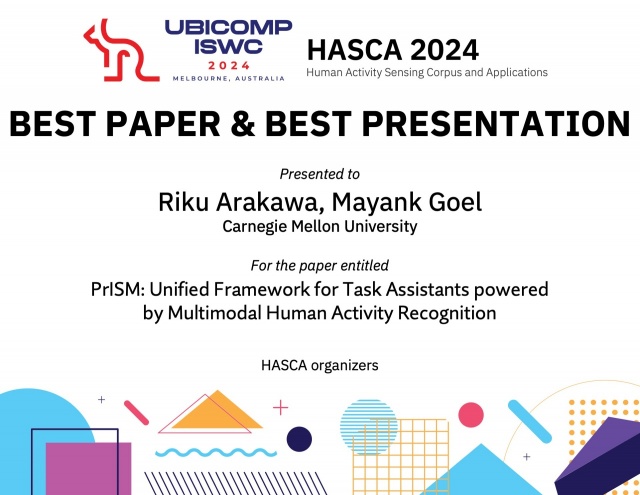Welcome to HASCA2024 Web site!
HASCA2024 is an 12th International Workshop on Human Activity Sensing Corpus and Applications. The workshop will be held in conjunction with UbiComp/ISWC2024.
Important Dates
Submission Deadline: Jun. 7 Jun. 14 (extended)
Acceptance Notification: Jul. 5
Camera-ready: Jul. 19
Workshop: Oct. 5, 2024 at Melbourne, Australia
Challenges
Following challenges are held with HASCA 2024.
Please refer to each challenge website for details including rules and deadlines.
Sussex-Huawei Locomotion Challenge 2024
http://www.shl-dataset.org/activity-recognition-challenge-2024/
WEAR Dataset Challenge
https://mariusbock.github.io/wear/challenge.html
Abstract
The recognition of complex and subtle human behaviors from wearable sensors will enable next-generation human-oriented computing in scenarios of high societal value (e.g., dementia care). This will require large-scale human activity corpora and improved methods to recognize activities and the context in which they occur. This workshop deals with the challenges of designing reproducible experimental setups, running large-scale dataset collection campaigns, designing activity and context recognition methods that are robust and adaptive, and evaluating systems in the real world. We wish to reflect on future methods, such as lifelong learning approaches that allow open-ended activity recognition. The objective of this workshop is to share the experiences among current researchers around the challenges of real-world activity recognition, the role of datasets and tools, and breakthrough approaches towards open-ended contextual intelligence.
The objective of this workshop is to share the experiences among current researchers around the challenges of real-world activity recognition, the role of datasets and tools, and breakthrough approaches towards open-ended contextual intelligence. We expect the following domains to be relevant contributions to this workshop (but not limited to):
Data collection / Corpus construction
Experiences or reports from data collection and/or corpus construction projects, such as papers describing the formats, styles or methodologies for data collection. Cloud- sourcing data collection or participatory sensing also could be included in this topic.
Effectiveness of Data / Data Centric Research
There is a field of research based on the collected corpus, which is called “Data Centric Research”. Also, we solicit of the experience of using large-scale human activity sensing corpus. Using large-scape corpus with machine learning, there will be a large space for improving the performance of recognition results.
Tools and Algorithms for Activity Recognition
If we have appropriate and suitable tools for management of sensor data, activity recognition researchers could be more focused on their research theme. However, development of tools or algorithms for sharing among the research community is not much appreciated. In this workshop, we solicit development reports of tools and algorithms for forwarding the community.
Real World Application and Experiences
Activity recognition "in the Lab" usually works well. However, it is not true in the real world. In this workshop, we also solicit the experiences from real world applications. There is a huge gap/valley between "Lab Envi- ronment" and "Real World Environment". Large scale human activity sensing corpus will help to overcome this gap/valley.
Sensing Devices and Systems
Data collection is not only performed by the "off the shelf" sensors. There is a requirement to develop some special devices to obtain some sort of information. There is also a research area about the development or evaluate the system or technologies for data collection.
Mobile experience sampling, experience sampling strategies:
Advances in experience sampling ap- proaches, for instance intelligently querying the user or using novel devices (e.g. smartwatches) are likely to play an important role to provide user-contributed annotations of their own activities.
Unsupervised pattern discovery
Discovering mean- ingful repeating patterns in sensor data can be fundamental in informing other elements of a system generating an activity corpus, such as inquiring user or triggering annotation crowd sourcing.
Dataset acquisition and annotation through crowd-sourcing, web-mining
A wide abundance of sensor data is potentially in reach with users instrumented with their mobile phones and other wearables. Capitalizing on crowd-sourcing to create larger datasets in a cost effective manner may be critical to open-ended activity recognition. Online datasets could also be used to bootstrap recognition models.
Transfer learning, semi-supervised learning, lifelong learning
The ability to translate recognition mod- els across modalities or to use minimal supervision would allow to reuse datasets across domains and reduce the costs of acquiring annotations.
